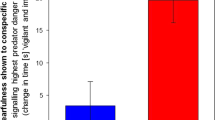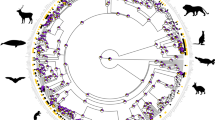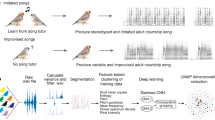Abstract
THE tree-shrews (family Tupaiidae), small squirrel-like mammals occurring throughout South-east Asia, are currently classified1 into two subfamilies: Ptilocercinae (nocturnal pen-tailed tree-shrews; genus Ptilocercus) and Tupaiinae (diurnal tree-shrews; genera Tupaia, Anathana, Dendrogale, Lyongale, Urogale). The overall systematic status of the family is still controversial. The tree-shrews are variously allocated to the Primates2–3, Insectivora or to an entirely separate order of mammals4–6. Recently the unusual maternal behaviour of one tree-shrew species, Tupaia belangeri, together with other reproductive characteristics, has been interpreted as further evidence excluding tree-shrews from the Primates1. Key features of maternal behaviour in captivity are that the mother deposits her young in a separate nest subsequently visited for suckling only once every 48 h. If such behaviour and its functional correlates are typical of all tree-shrew species, arguments based on reproductive peculiarities could be more confidently integrated with considerations of methodology, general morphological evidence7, detailed information on the central nervous system8 and the results of biochemical investigations9 to reach a balanced assessment of the phylogenetic relationships of tree-shrews.
This is a preview of subscription content, access via your institution
Access options
Subscribe to this journal
Receive 51 print issues and online access
$199.00 per year
only $3.90 per issue
Buy this article
- Purchase on Springer Link
- Instant access to full article PDF
Prices may be subject to local taxes which are calculated during checkout
Similar content being viewed by others
References
Martin, R. D., Z. Tierpsychol., 25, 409–532 (1968).
Le Gros Clark, W. E., The Antecedents of Man (Edinburgh University Press, 1971).
Buettner-Janusch, J., in Evolutionary and Genetic Biology of Primates (edit. by Buettner-Janusch, J.), (Academic Press, London and New York, 1963).
Gregory, W. K., Bull. Amer. Mus. Nat. Hist., 27, 1–524 (1910).
van Valen, L., Evolution., 19, 137–151 (1965).
McKenna, M. C., Amer. Mus. Novit., 2158, 1–16 (1963).
Martin, R. D., Man., 3, 377–401 (1968).
Campbell, C. B. G., Evolution, 20, 276–281 (1966).
Hafleigh, A. D., and Williams, C. A., Science, 151, 1530–1535 (1966).
D'Souza, F., in Prosimian Biology (edit. by Martin, R. D., Doyle, G. A., and Walker, A. C.), (Duckworth, London, in the press).
Wharton, C. H., J. Mammal., 31, 352–354 (1950).
Martin, R. D., J. Reprod. Pert. Suppl., 6, 49–66 (1969).
Sorenson, M. W., in Primate Behaviour, 1, 141–193 (edit. by Rosenblum, L. A.), (Academic Press, New York, 1971).
von Holst, D., Z. Vergl. Physiol., 63, 1–58 (1969).
Kuhn, H. J., and Starck, D., Natur. u. Museum, 96, 263–271 (1966).
Conaway, C. H., and Sorenson, M. W., Symp. zool. Soc. Lond., 15, 471–492 (1966).
Sorenson, M. W., and Conaway, C. H., J. Mammal., 49, 502–512 (1968).
Author information
Authors and Affiliations
Rights and permissions
About this article
Cite this article
D'SOUZA, F., MARTIN, R. Maternal behaviour and the effects of stress in tree shrews. Nature 251, 309–311 (1974). https://doi.org/10.1038/251309a0
Received:
Revised:
Issue Date:
DOI: https://doi.org/10.1038/251309a0
Comments
By submitting a comment you agree to abide by our Terms and Community Guidelines. If you find something abusive or that does not comply with our terms or guidelines please flag it as inappropriate.



